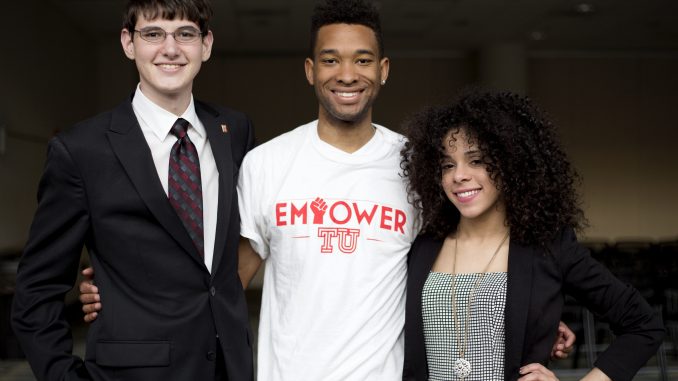
Empower TU, which served as Temple Student Government’s executive team for 2016-17, will leave TSG on May 1.
Empower TU leaders Aron Cowen, Jai Singletary, Kelly Dawson and the rest of the Executive Branch worked during their administration to help establish gender-inclusive housing and bring a Women Organized Against Rape satellite office to Main Campus.
Dawson, the vice president of internal services, was the liaison between students and the university while the collaboration with WOAR was finalized.
In January, Dawson said the partnership helped alleviate concerns about “the politics of accusing someone.”
“It’s important that Temple create a third party,” she said.
Titus Knox, TSG’s director of student affairs and former president of the Queer Student Union, said in February that the Executive Branch reached out to students to learn what they wanted for gender-inclusive housing and then shared that information with the departments working to make that a reality.
Gender-inclusive housing will be offered for the first time on Main Campus for Fall 2017.
During its administration, Empower TU also established Parliament, a 37-member legislative body.
“Overall, I think it’s worked out very well,” said Cowen, the student body president. “As with any large structural change, there’s going to be growing pains and that’s part of it. I think it was completely worth it and I think it’s on good footing for the future.”
The initial structure of Parliament was the product of more than 200 hours of executive meetings, Cowen added. The Executive Branch compared the proposed structure of Parliament to two dozen schools with similar student legislative bodies.
“We had a strong slate of candidates, both in the special election and this one, which bodes really well for the future of [Parliament],” he said.
Cowen said he thought the greatest challenge of his administration was representing the entire student body.
“You really have to make sure you’re not the only one in the room,” he said. “One person can’t represent 40,000 voices with the diversity of thought they deserve. Leadership isn’t about one person, it’s about facilitating and being a platform for everyone else.”
Past TSG administrations recognized the need to expand Tuttleman Counseling Services because students were still facing long wait times, Cowen said.
Tuttleman will gain a 50 percent space increase this summer when it moves to 1700 N. Broad St.
“It was just a matter of us being conscious and advocating for it in meetings with facilities and financial departments and keeping this as our priority,” Cowen said.
“We had students say ‘now that I think the wait line might not be as long, I can finally get the help I need,’” he added. “That’s really gratifying. That’s what it’s all about.”
Empower TU’s platform outlined plans for TSG to obtain a voting seat on the Board of Trustees. Cowen said those plans changed after he learned how the Board functioned.
“The Board operates mainly by consensus,” he said. “I honestly can’t think of a time where one vote made any difference. We found that the more important thing was … making sure we had a seat at the table in the conversations leading up to a vote.”
During the Board’s public sessions, there is seldom open discussion on the voting topics and trustees almost always unanimously approve motions.
Singletary, the vice president of external affairs, headed the Student Accessibility Task Force. He worked with Shawn Aleong, TSG’s deputy director of campus life and diversity, to construct a student-led task force to “observe areas of improvement” in Temple’s compliance with the Americans with Disabilities Act.
Students who applied to the task force reviewed buildings on Main Campus and checked them against a modified ADA checklist, focusing on areas like bathrooms, signs, elevators and stairs, Singletary said.
Leaders of the task force met with Facilities Management on Monday to report the task force’s findings through a policy proposal pitch, Singletary said.
The task force found that bathrooms in Ritter Hall’s upper levels did not have accessible stall doors. They also found that some bathrooms in Ritter, Gladfelter and Anderson halls did not have grab bars and that not all signs around campus had Braille, he added.
“My next question is, ‘who do we need to talk to? What do we need to say?’” Singletary said. “And how can we say it in order to be convincing, to make sure that whoever we talk to takes it seriously and implements the necessary adjustments?”
Empower TU also established community meetings where students and community members could interact with the hopes of setting a precedent, Singletary said.
“It’s not a secret that, right now, among students, among community residents, among professors, that it’s not the healthiest relationship,” he said.
Both Singletary and Cowen were involved with the Good Neighbor Initiative, a program that encourages students to build relationships with community residents.
Singletary, who sat on a committee to “revamp” the program, wished he would have been involved sooner.
“I feel like we jumped on it too late,” he said. “We hope, given the time we have left, we can change to make sure that the new program is fully functioning and has no gaps by the 2017-18 academic year.”
Amanda Lien can be reached at amanda.lien@temple.edu or on Twitter @amandajlien.


Be the first to comment